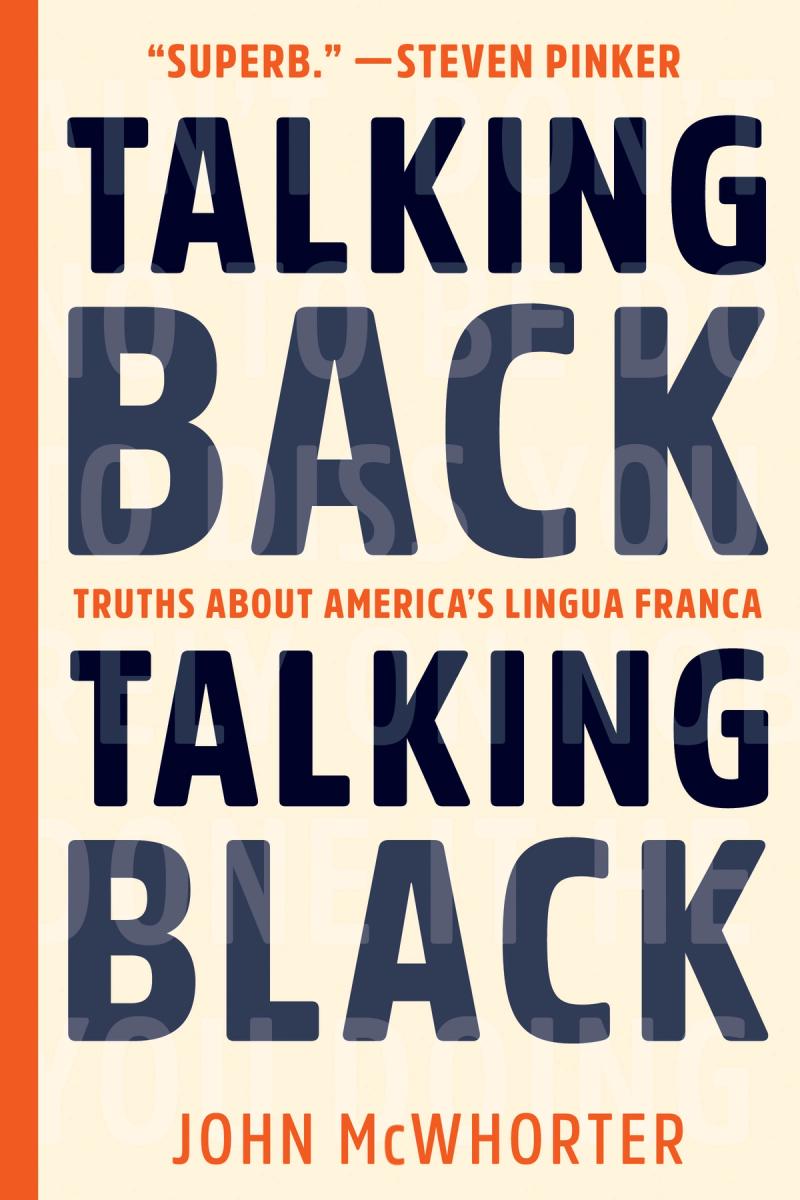In [Talking Back, Talking Black], McWhorter offers an explanation, a defense, and, most heartening, a celebration of the dialect that has become, he argues, an American lingua franca. . . . [He] demonstrates the ‘legitimacy’ of Black English by uncovering its complexity and sophistication, as well as the still unfolding journey that has led to its creation. . . . [His] intelligent breeziness is the source of the book’s considerable charm.
Talking Back, Talking Black
Truths About America’s Lingua Franca
It has now been almost fifty years since linguistic experts began studying Black English as a legitimate speech variety, arguing to the public that it is different from Standard English, not a degradation of it. Yet false assumptions and controversies still swirl around what it means to speak and sound “black.” In his first book devoted solely to the form, structure, and development of Black English, John McWhorter clearly explains its fundamentals and rich history while carefully examining the cultural, educational, and political issues that have undermined recognition of this transformative, empowering dialect. Talking Back, Talking Black takes us on a fascinating tour of a nuanced and complex language that has moved beyond America’s borders to become a dynamic force for today’s youth culture around the world.
Literary Hub “Titles for the Times” selection
Chicago Woman magazine “Must-Read Book on African American Culture” selection
Journal of Blacks in Higher Education “Books of Interest” selection
Tablet magazine’s Unorthodox “Year’s Literary Highlights” selection
Literary Ashland “What People Are Reading” selection
San Francisco Chronicle/SFGate “Recommendations from Bay Area Independent Bookstores” selection
Book Are Magic “Necessary Nonfiction for Black History Month” selection
Library Journal/GOBI Library Solutions “Language Best Sellers of the Year” list
University City Public Library “Book Challenge” selection
Darien Library “Staff Reading” pick

Ebook
- ISBN
- 9781942658214
Paperback
- ISBN
- 9781942658580
“Who Gets to Use Black English?” John McWhorter, author of Talking Back, Talking Black, writes about African American Vernacular English (AAVE) in the Atlantic and discusses his op-ed on WNYC’s Brian Lehrer Show.
John McWhorter talks about Talking Back, Talking Black in the Talks at Google series and on C-SPAN’s Book TV, WNYC’s All Things Considered, Tablet magazine’s Unorthodox podcast, Slate’s Lexicon Valley podcast, and the Mixed Experience podcast. He also discusses the book in the Heleo Conversations series and with Columbia Magazine, Columbia College Today, and Literary Ashland.
John McWhorter teaches linguistics, Western civilization, music history, and American studies at Columbia University. A New York Times best-selling author and TED speaker, he is a columnist for CNN.com, a regular contributor to the Atlantic, a frequent guest on CNN and MSNBC, and the host of Slate’s language podcast Lexicon Valley. His books on language include The Power of Babel; Our Magnificent Bastard Tongue; Words on the Move; Talking Back, Talking Black; and The Creole Debate.
visit author page »Praise for Talking Back, Talking Black
Talking Back, Talking Black is [McWhorter’s] case for the acceptance of black English as a legitimate American dialect. . . . He ably and enthusiastically breaks down the mechanics.
— New York Times Book Review
McWhorter considers complex issues and leaves the reader with a more clear understanding of language and the implicit assumptions surrounding it. . . . In this time of great anxiety and injustice, [Talking Back, Talking Black] provides insight into a cultural issue that has long been written off and snubbed by many. And as such, his book is proving itself to be about so much more than just language.
Drawing on research, popular culture, and his own expertise as a linguist and black American, McWhorter conveys the roots and richness of the dialect that has come out of the experiences of black Americans. . . . [Talking Back, Talking Black] is an engaging look at the English language as spoken by many black Americans as well as the long history of stereotyping that has prevented an objective analysis of a rich language tradition.
In Talking Back, Talking Black, John McWhorter, the maestro at communicating linguistics to the public, succeeds in helping the reader to ‘actually hear Black English in a new way,’ while hipping linguists to some features of this vibrant variety they might not have considered before.
— John R. Rickford, former president of the Linguistic Society of America and coauthor of Spoken Soul: The Story of Black English
John McWhorter does an excellent job making the case for Black English as a fully fledged dialect of English. He also does an excellent job of presenting the linguistic arguments in a way that is easy to digest.
— Nathaniel Hattrick, Liberty Bay Books (Poulsbo, WA)
[McWhorter] presents a broader, reframed argument with the sociocultural context necessary [for Black English] to be accepted more broadly. . . . . I was hooked on this book at the dedication: saying of his daughter, ‘I hope she will read this as soon as she is old enough to take it in, to make sure she never for a second thinks black people’s speech is full of mistakes.’
Perfect for amateur linguists looking for a new angle on current discussions of diversity. John McWhorter doesn’t get too technical as he discusses the mechanics of AAVE, but draws attention to the subtle aspects of the dialect.
— Sarah Rettger, Porter Square Books (Cambridge, MA)
Timely in the sense we should have already been talking about it, but thank God someone is talking about it now; McWhorter tackles the idea that African American Vernacular is grammatically incorrect. Decades of associating Black English with error has fed into our nation’s history of racism and vice versa. It is imperative, especially in today’s political landscape that we tackle our hidden prejudice and examine what makes it so. Easy to read in an evening; McWhorter explains not only the grammatical aspects of AAV, but examines cultural backgrounds and the political landscape of race as well. Do yourself a favor, read this book, then take a hard look in the mirror. I know I will.
— Atticus Solomon, Literati Bookstore (Ann Arbor, MI)

